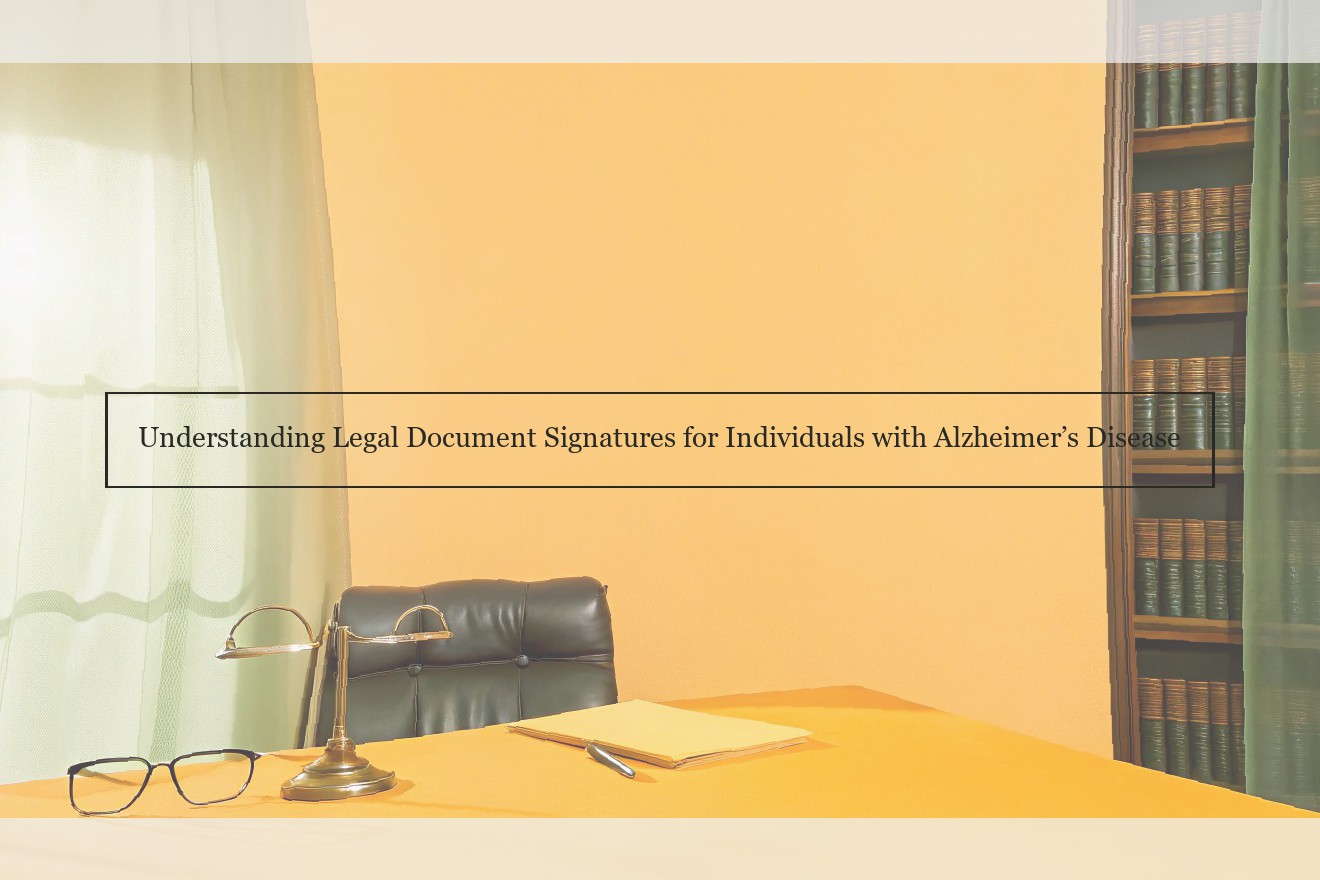Showing Capacity to Execute Legal Documents
Generally, in order to sign a legal document, an individual must have the requisite capacity to understand the general nature of the document (e.g., a will, trust or other legal principle). This means that the individual must possess the "capacity to sign." (Some documents have different standards for signature, which may be discussed in a related section.) Separate from the requirement that an agent have the requisite authority to sign a document on behalf of the principal, there is also an expectation of the general capacity of the principal to sign legal documents. This is generally based on a person’s rational thought processes and the expectation of the principal that he or she understands the document being signed. To some extent, this capacity is a separate issue from the authority of the agent – just because the principal has the specific authority to sign a document on behalf of the principal, the agent must also be mindful of the principal’s capacity to sign the document. Generally, the presumption is that the principal has the capacity to understand the general nature of the document when asked to sign the document (i.e., it is presumed the principal will understand the document and the general nature of the legal principles contained therein). But that presumption is subject to challenge, especially in the context of diminished capacity questions (a more detailed discussion of those legal considerations may be found in a specific section) . In the case of individuals with diminished capacity, including Alzheimer’s disease, questions regarding capacity to sign a document may also involve other considerations. Individuals with Alzheimer’s disease may have times when they are more clear-thinking and understand the general nature of the document being signed, and other times where they may be more confused or unable to understand the general nature of the document. This may also change from day-to-day or appointment to appointment with the individual. In some cases, even though the principal has some diminished capacity, the principal may still be able to understand the general nature of the document and sign the document. When questions arise, regardless of whether there is a statutory presumption regarding capacity, documentation should be thorough. Document the questions asked of the principal, the relationship of the individual asking the questions, and the responses given by the principal regarding the document (including multiple questions, as appropriate, to ensure the responses are not a mere repetition of the questions). It may also help to have a physician assist with the certification of capacity (if not already done), so that there is some professional oversight with regard to the question of capacity at that time and so that primary care physicians are kept in the loop (particularly if a primary care physician will be asked to assist with a certificate of incapacity if and when such questions are raised).
Evaluating Mental Competence in Alzheimer’s Patients
When assessing mental competency in those with Alzheimer’s disease, an individual must have a cognitive capacity to make informed choices and understand the nature and results of the decisions. This means that a person must have maintained mental capacity within a certain time duration prior to the date in which a document is being signed to be considered competent.
In order to determine mental competency, an assessment should be conducted by a trusted professional who is experienced in working with those with dementia. An assessment will usually include the following components: There are a variety of factors that are considered when assessing the competency of a person with dementia. The assessment consists of evaluating the medical and psychological condition of the person along with what decision or actions they are trying to make. Professionals will consider the frequency of contact, history of the relationship the person has with the person who is requiring the competency assessment, as well as any previous history the person may have of having a diminished capacity to make informed decisions. Assessing competency is very important when it comes to executing legal documents, including wills and trusts. The person in question must be mentally competent enough to have full understanding of what the document consists of. If there is doubt in the competency of a person, seeking the advice of an experienced attorney is suggested.
Legal Implications of Executing Documents
When an individual, who may have capacity issues, signs a legal document such as a contract or a deed, problems may arise. Often, the person who signs the document understands the transaction but frankly has no idea what the document contains. This simple fact that the document is signed by someone with possible capacity issues can lead to large problems down the road. When the document is signed by someone with potential incapacity, the onus is on the party seeking to impose the executed document (the party seeking to enforce the rights and obligations created by the document) to prove that the person signing the document had the legal capacity to sign the document because the law presumes (which is legally called a presumption of competency) that person does not. Often the other party has no incentive to challenge the competency of the person who signed the document. For example, in the case of a power of attorney, the holder of the power of attorney likely has an interest in using it. Therefore, that person has no incentive to argue that the document is invalid and cannot be used. Similarly, in the case of a health care directive or trust, the persons benefitted may not have any practical incentive to invoke arguments challenging the validity of the document.
A significant risk of a document containing the signature of a person with a diminished capacity is that it may be attacked some years down the road. A party entering into an agreement today with a person with a diminished capacity may not be around in five years to defend the validity of the document if it is challenged at that time. For example, suppose an elderly person executes a deed transferring their property to a child. If the parent becomes incapacitated a few years from now and then passes away, that deed may be challenged by disgruntled beneficiaries. The defense of the deed, however, may have been forgotten or gotten lost. This is part of estate and financial planning. To protect the parents’ home, it may be advisable to wait to change the title to the home until a more appropriate time.
Involvement of Guardianship and Power of Attorney
Although no one wants to think about it, the fact is that all people, including those suffering from Alzheimer’s sometimes need help managing their affairs. Managing real estate, completing a financial transaction, or signing a health care directive are all issues an individual suffering from Alzheimer’s may face. That is where guardianship comes into play.
If the issue is health-related (such as a failure to obtain proper medical treatment), generally a family member or friend can file a petition for guardianship. A judge will review and appoint a guardian who will step in to carry out the required functions. These include: managing real estate and personal property, signing legal documents on the person’s behalf, and overseeing their care.
Guardianship is a judicially sanctioned protective mechanism, meaning that the court determines whether a guardian is needed and who should serve as the guardian. The appointment may be modified or terminated by the same court that established it if circumstances change.
Of course, guardianship is not the only way an individual can have their affairs handled. A power of attorney is also an option. A power of attorney is a legal document specifying a person or organization that will act on another’s behalf. In other words, it allows a designated agent to step into the shoes of the principal and sign documents or carry out transactions without the requirement of prior approval or supervision by a court.
Compared to guardianship, a power of attorney is a lot easier to obtain. In some states, individuals must have capacity to sign a power of attorney. As a result, this advance planning tool is best suited for those who still have the capacity to understand and execute a power of attorney. It is generally inexpensive (ranging from $140 to $250), not invasive (no one needs to know that someone else is acting on behalf of the individual), and it avoids having a judge involved in the situation. The downside is that a power of attorney is not always recognized by third parties (those parties are not required to accept it unless they want to). If a power of attorney is rejected by a third party, getting a guardianship may be warranted.
Steps to Validate the Documents
1. Seek Professional Guidance
In a perfect world, all situations involving adults with Alzheimer’s disease would be straightforward. Rarely are things that simple. In the overwhelming majority of circumstances, the situation involves financial risk. Certainly, drafting or executing a will or trust is risky enough to warrant consulting a professional. But estate planning involves more than a will or trust. Real property, business interests and other assets require careful assessment and consideration. Consulting with someone knowledgeable about this field is critical. Please note that the most common document is not a power of attorney or a will. It is the warranty deed.
You might wonder why a deed is the most common document. Quite simply, people own real property but they have very few bank accounts, business interests or investments. Theoretically, the next most commonly drafted document is a power of attorney. Every individual should have a power of attorney, no matter how wealthy or poor. Power of attorney forms range from very complicated special purpose forms to short "statutory" forms. Only a small number of people consult with a professional before executing a power of attorney. However, the risks associated with granting a power of attorney are significant and I recommend seeking the advice and assistance of a professional. If you are concerned that someone has a power of attorney that was executed when the individual lacked legal capacity, you should seek legal advice.
Executors, administrators and agents under a power of attorney are confident that the documents are valid. Unfortunately, many situations involve family members with conflicting views about what is, and is not, a valid document . The trademark of these family situations is that everyone is reasonable when they hold the other side’s documents. Nobody thinks their own documents are a problem and everybody else’s documents are "clearly" a problem. The only way to win this battle is to go to court and make the judge decide. A person who contests a document has a burden to prove that it is not valid. This is certainly a difficult burden to meet. Unfortunately, once the battle is joined between family members and you are uncertain which document is valid and which is not, it is often too late.
Professional drafting that follows best practices should help to insure that the documents will be found to be valid by the judge in the event a dispute occurs. Here are some best practice recommendations:
The issue is really one of safety. Most of us want to plan for what happens to us after we die. A good plan will also consider what happens if we become incapacitated. We absolutely want a trusted individual to manage our affairs if we are unable to do so. Because Alzheimer’s disease is a degenerative and progressive illness, there are times when the decision making process might be questionable. Having the right tools and the right individuals in place helps keep our affairs in order. If for some reason, the tools fail or the trusted individual is not able or unwilling to serve as agent, you want the correct document to be able to refute the allegations being made. For the safety and security, follow the recommendations found in this document. Most importantly, seek your own legal counsel as soon as the first signs of any illness appear.
Real Cases and Legal Examples
Legal issues involving signing of documents by persons with Alzheimer’s disease
Moss v. Estates of Anderson, 856 N.W.2d 855 (Iowa 2014) – The Iowa Supreme Court considered whether a person who later develops dementia is able to past a "testamentary capacity" at the time she signed a deed transferring a home to a family member. In this case, an elderly woman with Alzheimer’s disease signed a quitclaim deed in favor of her son shortly before her death. When the woman’s estate was divided after her death, the woman’s daughter objected to the transfer of the home to her brother. The trial court rules for the daughter, but on appeal, the Iowa Supreme Court held that, although a rebuttable presumption of lack of capacity arose from the fact that the woman had developed dementia subsequent to the signing of the deed, the estate failed to prove that the woman lacked a sufficient testamentary capacity at the time she signed the deed.
In re Estate of Hendrickson, 12 A.3d 851 (Del Ch. 2010) – In this case a woman who had been diagnosed with Alzheimer’s disease was found to have sufficient capacity when she signed a power of attorney that provided her son with power to handle her financial affairs. In rendering its decision, the court considered the medical testimony of the woman’s treating physicians, the opinions of a forensic psychologist, and the opinion of the woman’s banker, all of whom had known the woman for years. The testimony presented painted a picture of an elderly woman with Alzheimer’s, but with a sufficient penumbra of capacity to execute the power of attorney.
In Re James M. Moore and Shirley J. Moore, 919 A.2d 12 (Vt. 2007) – In Vermont, the court was faced with the question of whether a power of attorney was validly executed where the principal had been diagnosed with Alzheimer’s disease. The Vermont statute governing powers of attorney requires that a principal have the understanding to make a voluntary action at the time it is made. However, since the powers of attorney were executed when the principal had early stage Alzheimer’s, the court found that although the powers of attorney were invalid under Vermont law, the transfers should be upheld based on the court’s equitable powers. More recently, in Re Estate of Mower, 2014 VT 77 the Vermont Supreme Court rejected the result it reached in Moore and ordered that a transfer of property be set aside even though the resulting hardship from the tax consequences on the other parties would be extreme.
Guidance for Families and Caregivers
Navigating the complexities of legal matters requires careful consideration, even more when a loved one is unable to do so due to conditions such as Alzheimer’s disease. In such circumstances, it’s important for the family and caregivers to strategically manage the legal processes while upholding the rights and wishes of the patient. One practical tip is to establish open and clear communication with all parties involved (e.g., healthcare providers, legal advisors, and family members). Developing a care team is essential — in fact, this could comprise of a doctors, lawyers, caregivers, and family — to ensure everyone is on the same page throughout the processes. It is prudent for family and caregivers to review the patient’s estate plan frequently and ensure that all the relevant documents are updated and in order. Then , it is necessary to carefully manage all communications and official correspondence. Writing a letter to the lawyer explaining the situation will help set the stage for the subsequent meetings and interactions. If the patient is unable to express their wishes or sign off on documents, a durable power of attorney can be drafted to facilitate the process. Additionally, any wills or beneficiary designations should be reviewed to see if they need to be updated. Any previous wishes regarding the patient’s finances, property, health care, and other matters must also be considered when drafting the new plan. When dealing with a person afflicted with Alzheimer’s disease, and other medical and cognitive issues, families and caregivers need to be adequately prepared to make decisions on behalf of their loved one when required. In the event of any disputes or controversies, the family should consult a lawyer for assistance.




+ There are no comments
Add yours